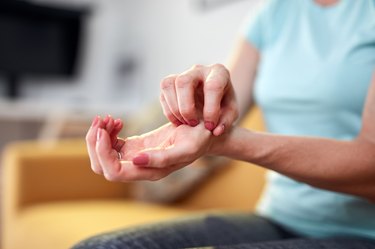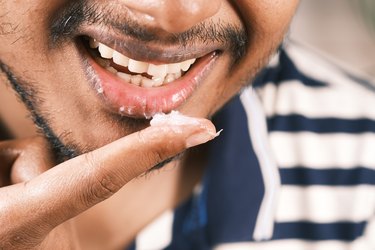
Of all the pesky and uncomfortable things that can happen to your body, itching definitely ranks pretty high on the list. And when you have itchy skin all over? Talk about annoying (and inconvenient).
Itchiness might first make you think you have a skin condition, such as eczema or psoriasis.
Video of the Day
Video of the Day
Here's a look at some of the possible causes of all-over body itching — and what you can do to fix it.
1. You Have Super Dry Skin
One of the most common causes of itchy skin, especially during the cold and dry winter months, is dry skin. If your skin is dry, you may notice it's especially rough to the touch and may even be flaky or scaly.
The lack of moisture in the skin can lead to itching, notes Marisa Garshick, MD, dermatologist at Medical Dermatology & Cosmetic Surgery in New York.
Fix It
While you can’t change the weather, you can alter certain lifestyle habits that can exacerbate dry skin, such as taking warm (not hot) showers that last no longer than 10 minutes. Additionally, Dr. Garshick says applying moisturizer to the skin immediately after a shower can help lock in moisture.
Keep this in mind, though: “In some cases, dry skin can be associated with atopic dermatitis, so it’s important to make an appointment with a board-certified dermatologist if you’re not finding relief through at-home care alone,” she says.
2. It's an Allergic Skin Reaction
Commonly, an allergic reaction presents as a skin rash and an uncontrollable itch, says Aanand Geria, MD, dermatologist based in Verona, New Jersey. Sometimes, though, allergic reactions can cause itchiness without a rash.
"Substances such as nickel, fragrances or latex can be common causes of such reactions and appear in many products we use daily," he adds.
Fix It
To relieve the type of itch associated with an allergic skin reaction, Dr. Geria recommends making an appointment with a board-certified dermatologist who can help you determine the root cause of the skin reaction and prevent it from reoccurring.
In the meantime, take note of any new products you've started using that might affect your skin, such as laundry detergent, body wash or body lotion. Stop using the new product to see if the itchiness goes away — if it does, you may be allergic to one or more of its ingredients.
3. You Have Eczema
Eczema is an inflammatory condition that causes itchy skin and sometimes dry or scaly skin, rashes, blisters and skin infections, according to the National Eczema Association. It can first appear in childhood or start in adulthood, usually when someone is in their 20s or over age 50.
Mild eczema typically causes small areas of dry, itchy skin, but in more severe cases, eczema can spread all over the body and cause constant itchiness, according to NHS. If the person is fair, the affected skin often looks red, while it might appear as dark brown, purple or grey on dark skin.
Eczema usually occurs in a cycle, with periods when symptoms are better followed by flare-ups, when they get worse.
Fix It
There is no cure for eczema, but symptoms can usually be managed with at-home remedies such as bathing and moisturizing regularly, managing stress and avoiding your flare-up triggers. Over-the-counter eczema creams can help, as can anti-itch lotions. But if these products don't control the itch, you should see a dermatologist to discuss prescription options.
4. You Have an Infection or Infestation
Some infections or infestations can cause itching all over the body, including the following:
- Chickenpox
- Fungal infections
- Scabies
- Bed bugs or mites
- Fleas
Fix It
In this case, the itching will go away once you clear the infection or infestation. See your doctor, who can diagnose you and prescribe the proper treatment.
5. You Have Anemia
Anemia is usually associated with symptoms like weakness and fatigue. But you can also get itchy skin all over with or without a rash.
While doctors don't know exactly why people with iron-deficiency anemia can develop a rash, one theory is that low iron levels cause thin skin and water loss, leading to itching. Itching from aplastic anemia could be due to low platelets — a condition called thrombocytopenia, per the Cleveland Clinic.
If you do get a visible rash, it can look like tiny red or purple dots under your skin called petechiae, according to the Cleveland Clinic. While they can get bumpy and form patches if you scratch, they usually aren't painful.
Fix It
To treat itchy skin from anemia, your doctor may prescribe topical corticosteroids or antihistamines.
To completely get rid of an anemia rash, though, you need to treat the anemia. Iron-deficiency anemia can be treated with iron supplements and dietary changes, while aplastic anemia is typically managed with blood transfusions or immunosuppressants, per the Cleveland Clinic. Talk to your doctor about what's right for you.
6. You Have an Overactive Thyroid
One of the lesser known (but common) symptoms of hyperthyroidism — or overactive thyroid — is itching.
With hyperthyroidism, your thyroid gland makes too much of the thyroid hormone, Dr. Garshick says. "Hypothyroidism can cause dry skin, which can lead to itching as well as an associated rash or changes in the skin."
Fix It
If you have hyperthyroidism-related itching of the skin, moisturizing creams and anti-itch lotions are your best bet, Dr. Garshick says.
She also recommends talking with your doctor or, ideally, an endocrinologist who specializes in treating thyroid disorders, to make sure you’re taking the right medications to keep your thyroid in check.
7. You Have Kidney Disease
Kidney disease means your kidneys are damaged and can't filter blood the way they should, per the National Institute of Diabetes and Digestive and Kidney Diseases (NIDDK). While fatigue, frequent urination and swelling are common symptoms, so is dry, itchy skin.
"Generally with chronic kidney disease, there can be findings associated with full-body itching which is not fully understood," Dr. Garshick says. "That said, it is important to care for the skin to minimize dryness and use gentle products on the skin."
Fix It
If you have chronic kidney disease and are experiencing itchy skin, you can talk to your doctor about medication options that specifically address itching, Dr. Garshick says. In fact, the FDA recently approved an injectable medication called KORSUVA, which was created to help treat moderate-to-severe itching associated with chronic kidney disease.
8. You Have a Nerve Disorder
Although rare, itching all over without a rash may be an early indicator of a nerve disorder like Parkinson's disease or multiple sclerosis, according to Raman Madan, MD, director of cosmetic dermatology at Northwell Health.
"In these conditions, the itch is caused by stimulation of nerve endings," he says. "When they are overly sensitive, they can cause itch."
In addition to itching, Parkinson's disease can cause other skin issues like oily skin and inflamed (red) skin, per the Parkinson's Foundation. Other early symptoms include hand tremors, lack of facial expressions, soft or slurred speech and stiff or slow movements, according to the Mayo Clinic.
Symptoms of multiple sclerosis can vary widely from person to person but may include the following, per the Mayo Clinic: tingling, numbness or weakness in the limbs, lack of coordination, unsteady gait, blurry or double vision, vertigo, fatigue and slurred speech.
Fix It
There are many different courses of treatment for nerve disorders like Parkinson's disease, including medication, deep brain stimulation and MRI-guided ultrasounds, per the Mayo Clinic. Talk with your doctor if you are experiencing itchiness all over your body along with any of the other symptoms mentioned above. These can be early warning signs of a nerve disorder.
9. It's a Medication Side Effect
Some medications can cause itchy skin, including over-the-counter aspirin, prescription-strength opioids and even some antidepressant medications like Prozac and Zoloft, according to the American Academy of Dermatology Association (AAD).
Fix It
If you're experiencing itching that you think might be due to a certain medication you're taking, especially if the onset began shortly after you started taking this medication, speak to your doctor. They may be able to prescribe you a different medication.
10. You Have Diabetes
While the most common symptoms associated with diabetes are frequent urination and thirst, there are many others, including itchy skin without a rash.
This increased itchiness is due to elevated blood sugar, which can cause the skin to dry out more easily, says Eric Bricker, MD, internal medicine physician and Medical Director at SimplePay Health.
Fix It
If you have diabetes and are dealing with itchy skin, moisturizing is a great first step to protect the skin barrier and maintain adequate moisture levels, Dr. Garshick says. Additionally, she recommends using calamine lotion to cut down on itching. Try Swan Calamine Lotion ($5.30, Amazon).
If these over-the-counter solutions do not work, consider asking your doctor about a prescription steroid cream.
11. You Have a Liver Condition
Cholestasis is a condition in which bile from the liver becomes slowed or blocked, according to the National Library of Medicine. It can be caused by a variety of things, including alcoholic liver disease, pancreatitis, tumors or cysts, lymphoma or viral hepatitis. In addition to itching, symptoms might include dark urine, pale or clay-colored stools, nausea or vomiting, pain in the upper right abdomen and yellow skin or eyes.
Cholestasis can also occur during pregnancy, usually in the third trimester, according to the American Pregnancy Association. It typically causes itchy palms and feet, but some people may have all-over body itching with no rash.
Certain things can put you at a higher risk for cholestasis of pregnancy, including carrying multiples, past liver damage and a family history of cholestasis.
Fix It
Cholestasis is a serious condition, so you should see your doctor as soon as possible to get tested for the condition. If you're pregnant, you'll need to be monitored closely, and your provider may prescribe medication to help with your liver function. In some cases, the baby will need to be delivered early in order to avoid complications. Fortunately, the condition typically disappears within a few days of delivery, per the American Pregnancy Association.
When to See a Doctor
Given that dry skin is one of the most common causes of itching, first try to relieve your symptoms with an over-the-counter skin moisturizer or steroid cream like hydrocortisone.
If neither of these solutions resolve the itching, seeing your doctor is a great next step.
"Going to see a primary care physician for appropriate health screenings like for hypertension and diabetes is also a great time to bring up concerns regarding itching with your doctor," Dr. Bricker says.
- Centers for Disease Control and Prevention: "National Diabetes Statistics Report"
- American Thyroid Association: "General Information/Press Room"
- CDC: "Chronic Kidney Disease in the United States, 2021"
- FDA: "KORSUVA"
- Parkinson's Foundation: "Skin Changes"
- Clinical, Cosmetics and Investigational Dermatology: "Skin disorders in Parkinson’s disease: potential biomarkers and risk factors"
- Cleveland Clinic: "Anemia Rash"
- NIDDK: "Kidney Disease"
- Mayo Clinic: "Parkinson's Disease"
- Mayo Clinic: "Parkinsons"
- Mayo Clinic: "Multiple Sclerosis"
- American Pregnancy Association: "Cholestasis of Pregnancy: Causes, Symptoms & Treatment"
- National Eczema Association: "What Is Eczema?"
- NHS: "Atopic eczema"
- National Library of Medicine: "Cholestasis"
Is this an emergency? If you are experiencing serious medical symptoms, please see the National Library of Medicine’s list of signs you need emergency medical attention or call 911.


